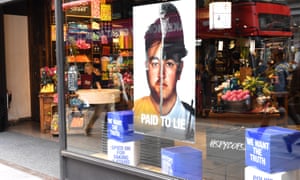The cosmetics retailer Lush has removed posters highlighting the misconduct of undercover police from the windows of all its stores after saying that shop staff had been intimidated by former officers.
The chain told of the posters’ removal on Thursday, saying it needed to protect staff in its 104 stores. The move came less than a week after it started the campaign to publicise the alleged wrongdoing of undercover officers who had infiltrated political groups.
The Lush campaign was criticised by the home secretary, Sajid Javid, and others, as being anti-police, poorly judged and potentially damaging to large numbers of officers who had nothing to do with the alleged wrongdoing.
As part of the campaign the retailer put up posters of a model dressed both as apoliceman and an activist, with the slogans “Police have crossed the line” and “Paid to lie”, alongside fake police tape.
There have been allegations that people disliking the campaign have been going into stores and intimidating staff to make them take down the posters. On Saturday, a day after the start of the campaign, Lush said some of its branches had removed the posters following “intimidation of our shop staff from ex-police officers and unhelpful tweets from those in high office”.
Lush said in a statement on Thursday: “For the safety of our staff we have suspended the window.” It is unclear if the posters will be reinstated or replaced with another image at a later stage in the campaign, which is due to end on 18 June.
The campaign, which includes a video, continues on its website. Working with groups campaigning for the victims of the undercover police, Lush is seeking to draw attention to the criticism of a much-delayed public inquiry that is examining the activities of police spies since 1968.

No comments:
Post a Comment